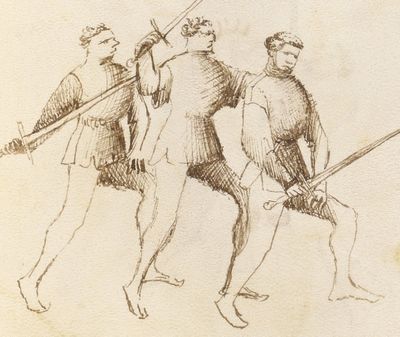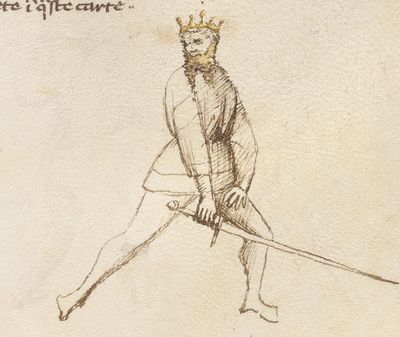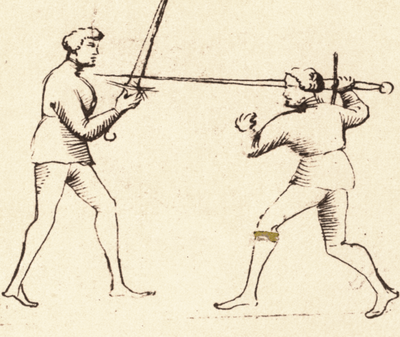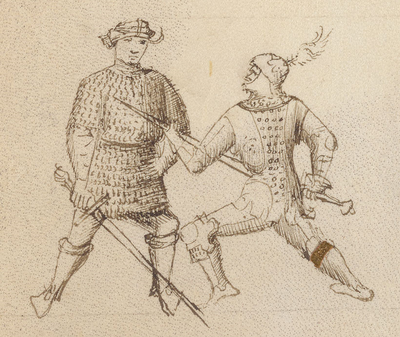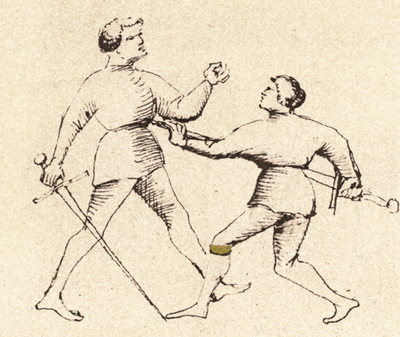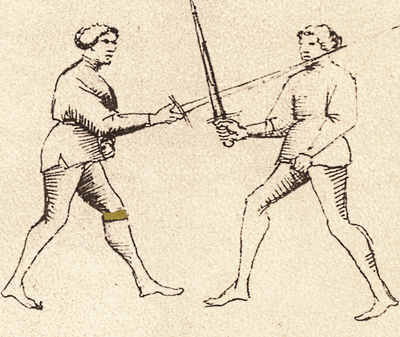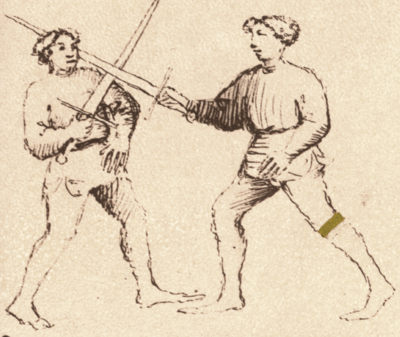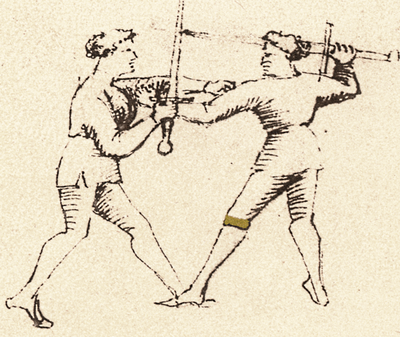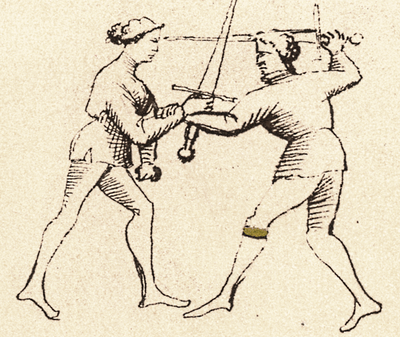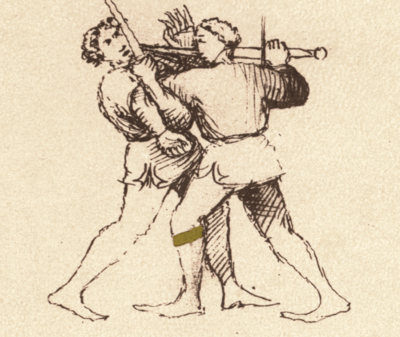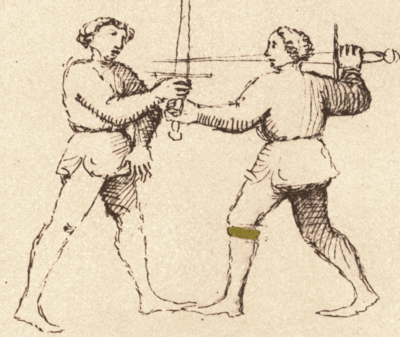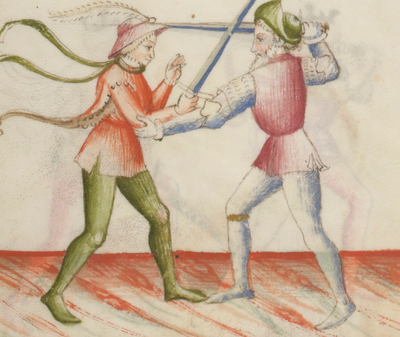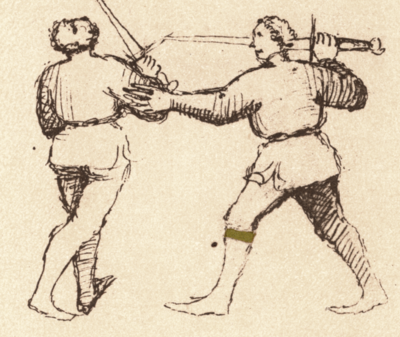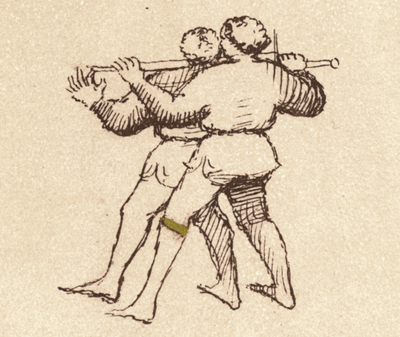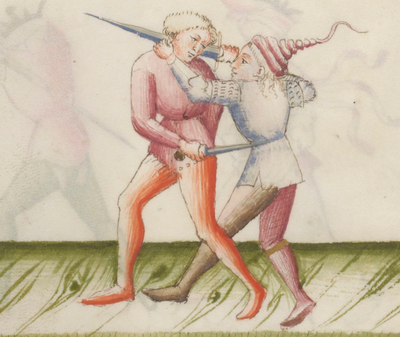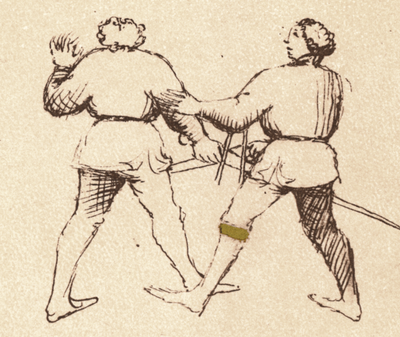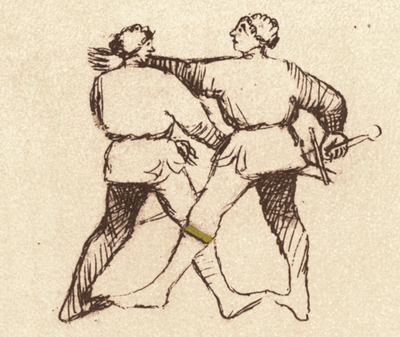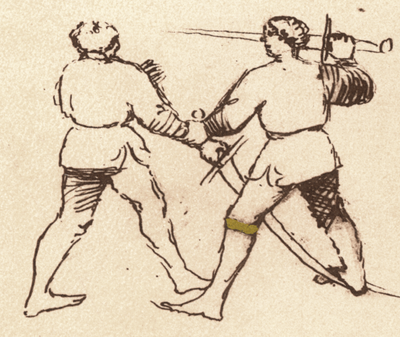|
|
You are not currently logged in. Are you accessing the unsecure (http) portal? Click here to switch to the secure portal. |
Difference between revisions of "Fiore de'i Liberi/Sword in One Hand"
| Line 164: | Line 164: | ||
|- | |- | ||
| − | | | + | | [[File:MS Latin 11269 12r-d.png|400px|center]] |
| [[File:Pisani-Dossi MS 14a-d.png|400px|center]] | | [[File:Pisani-Dossi MS 14a-d.png|400px|center]] | ||
| <p>[11] ''I will make you turn with the left hand<br/>And in that, I want to give you a great blow.''</p> | | <p>[11] ''I will make you turn with the left hand<br/>And in that, I want to give you a great blow.''</p> | ||
Revision as of 20:13, 22 September 2017
Images |
Images |
Paris |
Morgan Transcription |
Getty Transcription |
|||
|---|---|---|---|---|---|---|---|
[1] Here are three opponents who all want to kill this Master. The first aims to kill him with a thrust. The second intends a cut. The third will throw his sword at the master like a spear. If the Master can perform a mighty deed[1] and avoid being killed, then God will have indeed blessed him with great skill.[2] |
We are three players that wish to strike this Master. One would strike with the point, another the edge, and another wants to throw his sword against the aforesaid Master, so that it will be a great feat indeed if this Master is not killed. May God make him suffer. |
[17v-a] Noii semo tri zugadori che volemo ferir questo magistro. Uno gle di trare de punta l'altro de taglo, l'altro vole lanzare la sua spada contra lo ditto magistro. Si che bene sera grande fatto ch'ello non sia morto questo magistro. Che dio lo faza ben tristo. |
[20r-c] ¶ Noii semo tre Zugadori che volemo alcider questo Magistro. Uno gli de trare di punta, l'altro di taglo l'altro vole latt lançare la sua spada contra lo ditto Magistro. Si che ben sara grande fatto ch'ello non sia morto. che dio lo faza ben tristo. |
||||
[2] Whether throwing the sword or striking cuts and thrusts, You are cowards[3] and know little of this art. You are all words without any deeds. I challenge you to come at me one after another, if you dare, and even if there are a hundred of you, I will destroy all of you from this powerful guard. … |
If a wild one throws a sword, or if You are wicked and of this art you know little; you do things that words cannot describe. Come one by one whoever knows what to do and is able, and even if you are a hundred I will waste all of you with this guard (which is so good and strong). … |
[17v-b] Voi sete cativi e di questa arte save pocho. Fate gli fatti che parole non ha logo, vegna a uno a uno chi sa fare e po. Che se voi fosse cento tuti ve guastaro per questa guardia ch'e cosi bona e forte. Io acresco lo pe ch'e denanci uno pocho fora de strada. E cum lo stancho io passo alla traversa. E cum quelo passar io me covro rebatendo le spade, ve trovo discoverti, e de ferire ve faro certi. E si lanza o spada che me ven lanzada, tute le rebatto come i'o ditto passando fora de strada, segondo che vui vederite gli mie zoghi de dredo, de guardagli ch'io ven prego, e pur cum spada a una man faro mia arte |
[20r-d] ¶ Voii seti cativi e di quest'arte savete pocho. Fate gli fatti che parole non ano loco. Vegna a uno a uno chi sa fare e po. Che se voi fossi cento tutti vi guastero, Per questa guardia ch'e chossi bona e forte, Io acresco lo pe ch'e denançi un pocho fora de strada e cum lo stancho io passo ala traversa. E in quello passare mi crovo[!] rebattendo le spade[4] ve trovo discoverti[5] E de ferirre[6] vi faro certi. E si lanza o spada me ven alanzada, tutte le rebatto chome t'o ditto passando fuora di strada, Segondo che vedereti li miei zochi qui dreto. De guardagli che v'in prego. E pur cum spada a una mano faro mia arte, como vederete in queste carte. |
[13a-c] Per lançare de spada e trare taiio e punta |
|||
[3] With a step, I have made a cover with my sword …I will advance my front foot a little off the line, and with my left foot I will step crosswise,[9] and as I do so I will cross your swords, beating them aside and leaving you unprotected. I will then strike you without fail. And even if you throw your spear or sword at me, I will beat them all aside in the same manner I described above, stepping[10] off the line as you will see me demonstrate in the plays that follow, and which you would do well to study. And even though I am only holding the sword in one hand, I can still perform all of my art, as you will see demonstrated in this book. |
Taking a step, I cover my limb using my raging sword; …I advance my forward foot slightly out of the way, and with my left I step to the side. I cover myself during that step, beating your swords and finding you uncovered, and I will be certain to strike you. And whether lance or sword is thrown at me, I will beat them all just as I have said, stepping out of the way according to that which you see in my plays hereafter. Watch what I show to you, and with the sword in one hand I will make my art. |
[13a-d] Cum passo o fata coverta cum mia spada |
|||||
[4] In order to wound you again with this, my point, This is a play where if you wish to make this kind of thrust, you should be armoured. If your opponent strikes at you with a thrust or a cut, you first make your cover, and then quickly counter attack as shown. [The Getty resembles the Pisani Dossi, including the lack of armor.] |
In order to do it again, I will strike a bargain with you using my gloomy point; This is a play in which he who wants to thrust the point wants to be armored. When someone strikes at you with the point, or with the edge, make the cover and immediately thrust this in the way that is depicted. [The Paris resembles the Pisani Dossi, including the lack of armor.] |
[19r-a] Questo e uno zogo che vole essere armato chi vole metere tal punta. Quando uno te d tra de punta, o de taio, tu fai la coverta, e subito metegli questa per lo modo ch'e dipento. |
[21v-c] ¶ Questo e un zogo che vol esser armado chi vol metter tal punta. Quando uno ti tra di punta e de taglio, tu faii la coverta, e subito metti gli questa per lo modo ch'e depinto. |
[13b-a] Per ferirte anchora cum questa mia punta |
|||
[5] Here I have struck you in your head |
Here I struck the forehead, causing a bloody wound, |
[13b-b] Aqui io t'o ferido in la tua testa |
[11r-a] ¶ Hic ego sanguineo percussi vulnere frontem. | ||||
[6] Again I have struck your head without stepping I have rendered you completely unprotected, and now I will easily strike you in the head. And if I choose to pass forward with my rear foot, I can perform close range techniques against you, such as locks, dislocations and grapples. |
I have found you completely uncovered and I have struck you in the head for certain. And if I want to step forward with my rear foot, I can make many narrow plays against you (that is, the binds and breaks of grappling). |
[17v-d] In tuto t'o trovado discoverto, e in la testa t'o ferido per certo. E s'io cum lo mio pe de dredo voio innanzi passar asai zoghi stretti poria contra ti fare, zoe in ligadure roture, e in abrazare. |
[20v-b] ¶ In tutto t'o trovado discoverto, e in la testa t'o ferido per certo. E se io cum lo mio pe di dredo voglio inanci passare Assay zoghi stretti poria contra te fare, zoe in ligadure, rotture, & Abbrazare. |
[14a-a] Anchora la testa t'o ferida sença passare |
|||
[7] In this way, I uncover you to strike you with my point I have done what my teacher[15] told me to do. That is to say I stepped off the line making a strong cover. And having rendered my opponent unprotected I now easily place a thrust into his face. And with my left hand I will demonstrate that I can take his sword, and send it to the ground. |
I uncover you in order to strike a bargain with the point extended. I will avenge after this; I have done that which the Master has said—that is, I stepped out of the way making a good cover. And I found the player uncovered such that I certainly want to thrust my point in his face. And I want to try this with my left hand, to see if I can make your sword hit the ground. [In the Paris, the Scholar wears a crown.] |
[17v-c] Quello che ha ditto lo magistro io l'o ben fatto, zoe ch'io passai fora de strada fazando bona coverta. E lo zugadore trovo discoverto. Si che una punta gle voio metere in lo volto per certo. E cum la man stancha voio provare. Se la tua spada posso in terra fare andare. |
[20v-a] ¶ Quello che a ditto lo magistro io l'o ben fatto, zoe ch'io passai fora de strada façendo bona coverta, E lo zugadore trovo discoverto, si che una punta gli voglo metter in lo volto per certo, E cum la man stancha voglo provare, Se la tua spada posso in terra far andare. |
[13b-d] Per tal modo te discrovo[!] per ferirte de punta |
|||
[8] Because of the hand that I have put beneath your hilt, From this position I can easily strike or stab you. And if I advance my front foot forward, I can lock you in the middle bind, as shown in the third play of the first Remedy Master of the dagger.[18] Alternately I can do the play shown next, and strike and lock you as shown there. [In the Getty, the Scholar's opponent has his right foot forward.] |
You would mock me with your voice, and I shall call you blind; |
[20v-c] ¶ De taglio e de punta ben te posso ferire. Anchora se acresco lo pe ch'e denanzi, io ti posso ligare in ligadura mezana ch'e denanzi dipenta al terzo zogo del primo magistro rimedio di daga. Anchora questo zogo che m'e dredo io ti posso fare. E per tal modo ti posso ferire, e anchora ligare. |
[13b-c] Per la mane ch'i'o posta sotto tuo elzo |
[11r-d] ¶ Derideas me voce tua / cecumque vocato / | |||
[9] With my left arm, I have bound your right Here both your sword and your arm are effectively trapped, and you will not be able to escape before I strike you as described, because you have shown you know nothing of this play. |
[20v-d] ¶ La tua spada e'l tuo Brazo e ben inpresonado e no te'n poii fuzire che non ti fiera a mio modo, per che tu mostra saver pocho di questo zocho. |
[14a-c] Cum lo mio braço stancho lo drito t'o ligado |
|||||
[10] Because of the way in which I have caught your sword, Here I can easily strike you while taking your sword, and by rotating it in your hand I will make you drop it as the only way to prevent yourself being thrown to the ground. |
I decide to pluck the sword out of your slow hands; |
[21r-a] ¶ Qui te posso ben ferire, e la tua spada tore senza fallire. Voltandola in torno la mane, ti faro riversare, per modo che la spada te convien lassare. |
[14a-b] Per lo modo ch'i'o presa la tua spada |
[11v-d] ¶ Arbitror a manibus ensem tibi carpere lentis / | |||
[11] I will make you turn with the left hand Here I can strike you from the front, but this is not enough. By gripping your elbow I make you turn away, then I wrap[20] my sword around your neck from behind, and you will have no defense to this. |
At any time, with the hand, I would have turned the elbow, turning my sword around. |
[21r-b] ¶ Qui ti posso ferire denançi. e questo non mi basta per lo cubito che io ti penço, io ti faro voltare per ferirte di dredo, e la spada al collo ti poro butare, si che di questo non ti poraii guardare. |
[14a-d] Cum la man mancha io te faro voltare |
[12r-d] ¶ Cumque manu voluam cubitum voluendo cruentum | |||
[12] Because of the turn that I have given you by your elbow In the previous drawing I told you I would turn you and then quickly wrap my sword around your neck, as shown here. And if now I fail to cut your throat, then I am a pathetic fool. [The Getty resembles the Pisani Dossi.] |
Now I consider cutting the middle of your neck using the sword; |
[21r-c] ¶ Per quello zogo che m'e denanzi per quello modo ti fe io voltare. e subito la spada mia ti butai al collo. Se io non te taglo la gola di pur che io sia tristo e follo. |
[14b-a] Per la volta che per tuo cubito t'o data |
[12r-b] ¶ Nunc ego perpendo medium scidisse mucrone | |||
[13] This is a good break of the point on the ground You aimed[21] a thrust at me and I beat it to the ground. Do you see how you are now unprotected and can be struck? And I can also turn you and do you even more harm, by striking you from behind. |
[21r-d] ¶ Tu mi zitassi una punta, e io la rebatei a terra. Vede che tu sei discoverto, e che ti posso ferire. Anchora ti voglo voltare per farte pezo. E di dredo te feriro in quello mezo. |
[14b-b] Aquesto e un bon rompere de punta a terra |
|||||
[14] I have sending you to the ground in my thoughts: Because I turned you by pushing your elbow, I have quickly come to this position and from here I can throw you to the ground, where you will no longer be able to fight me or anyone else. |
[21v-a] ¶ Per la volta che ti fiei[!] fare penzando ti per lo cubito. A questo partido so vegnudo ben di subito. Per cason de butar te in terra, per che tu non fazi, ne a me ne altruii guerra. |
[14b-c] De mandarte in terra ii'o mio pensir |
|||||
[15] Either your sword is bent or it is broken This opponent struck at my head, and I beat his sword to the ground, coming to the position you see depicted here. Now after forcing you to turn away I will aggressively[22] wrap my sword around your neck. |
[21v-b] ¶ Questo mi trassi per la testa, & io rebatei la sua spada. Io so vegnudo a questo partido. Anchora ti faro volare voltare per non aver fallito. E la spada te mettero al collo, tanto son io ardito. |
[14b-d] O la tua spada e piegada overo ch'e rota |
- ↑ A “grande fatto” is something of great worth, like a mighty deed.
- ↑ “Tristo” can mean “sad”, but it can also mean “crafty”, “clever”, or “skillful”
- ↑ “Cativi” means “cowardly wretches”. Here Fiore’s Master is talking directly to the three men who seek his death.
- ↑ The "s" replaces an earlier letter that was scraped off, possible "S".
- ↑ Written as "e" and then corrected to "i".
- ↑ Word contains both an abbreviation for "r" and another letter was overwritten to "r"; it could also be read as "ferirere", but that's not a word.
- ↑ The second letter appears to have been corrected.
- ↑ A pun for ridere/riddare?.
- ↑ “ala traversa”—crosswise. Here this means sideways.
- ↑ Remember, “passando” might mean “passing” (passing step) or it might mean simply “stepping”.
- ↑ Tentative reading; badly damaged
- ↑ Tentative reading; badly damaged
- ↑ Tentative reading; badly damaged
- ↑ Badly damaged; also, could be a variant spelling of laeva.
- ↑ “Magistro” means both “Master” and “Teacher”. The translation “teacher” works well here.
- ↑ Lit. “made to the fingernails”, an expression meaning to be a perfect person.
- ↑ This page shows signs of scraping and rewriting.
- ↑ Getty 10v-c
- ↑ Romans used dative to describe body parts
- ↑ “Butare” actually means to “cast” or “throw”. I decided “wrap” would work better here.
- ↑ “Zitassi” means “cast” as in “threw”.
- ↑ “Ardito” means “bold”, “passionate” (“ardent”). But here I went after the meaning as I understand it, which is with intensity, thus “aggressively”.

